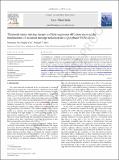Thermodynamic mixing energy and heterogeneous diffusion uncover the mechanisms of radiation damage reduction in single-phase Ni-Fe alloys
Author(s)
Jin, Miaomiao; Cao, Penghui; Short, Michael P.
DownloadMain article after revisions (2.310Mb)
Terms of use
Metadata
Show full item recordAbstract
Understanding and predicting radiation damage is of central importance to develop radiation-tolerant structural materials for current and next-generation nuclear systems. Single-phase solid solution alloys constitute attractive choices due to their promising mechanical properties and radiation tolerance. Here, by examining radiation-induced defect production and evolution in single-phase Ni-Fe alloys, we show that radiation damage resistance directly correlates with thermodynamic mixing energy and heterogeneity of defect diffusion. We found that radiation damage in materials decreases linearly with lowering mixing energy, and the relationship holds true for all studied Ni-Fe compositions. The damage reduction with varying composition is further ascribed to the increasing heterogeneity of point defect migration across a complex potential energy landscape that enhances defect recombination. This new insight into the dynamical evolution of radiation defects points to a thermodynamic criterion for designing radiation-tolerant materials.
Date issued
2018-04Department
Massachusetts Institute of Technology. Department of Nuclear Science and EngineeringJournal
Acta Materialia
Publisher
Elsevier BV
Citation
Jin, Miaomiao et al. "Thermodynamic mixing energy and heterogeneous diffusion uncover the mechanisms of radiation damage reduction in single-phase Ni-Fe alloys." Acta Materialia 147 (April 2018): 16-23 © 2018 Acta Materialia Inc
Version: Original manuscript
ISSN
1359-6454
Collections
The following license files are associated with this item: